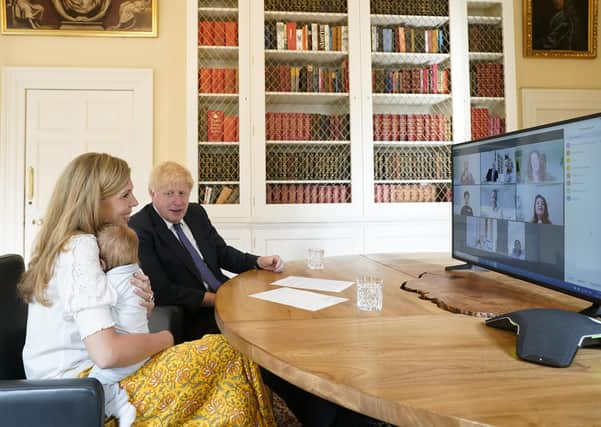Downing Street in ‘panic mode’ on Union as PM heads for Scotland


The Prime Minister will highlight economic support from the UK Treasury during the crisis, with his government subsidising the wages of nearly a third of Scottish workers.
It comes as polling suggests the independence campaign has a lead of up to 10 per cent, with the SNP predicted to win an unprecedented majority at next year’s Scottish Parliament elections. Mr Johnson’s handling of the pandemic has cost him support, with his net approval rating on the crisis lagging 99 points behind that of First Minister Nicola Sturgeon, at -39 points to her +60.
Advertisement
Hide AdAdvertisement
Hide AdLast week he denied his personal standing was a threat to the future of the UK, insisting that “the Union has more than proved its worth” during the crisis.
But a Cabinet source told the Sunday Times: “Michael [Gove] is in panic mode about the Union and Boris is in irritated mode.”
The First Minister welcomed news of the Prime Minister’s visit, claiming it would boost support for independence further, and on her 50th birthday tweeted: “Nice of Boris to send me a birthday pressie”.
Meanwhile, the Press and Journal reported that Lord McInnes, the director of the Scottish Conservative Party, will brief the Cabinet this week alongside polling guru James Kanagasooriam, who worked on the party’s 2016 Holyrood campaign, which saw them take a total of 31 seats.
In October, a senior Whitehall source warned of complacency in Downing Street over the risk of rising support for Scottish independence, telling The Scotsman: “There isn’t nearly enough panic.”
SNP deputy Westminster leader Kirsten Oswald said: “It speaks volumes of the Tory government’s sheer disdain for the people of Scotland that Boris Johnson believes a quick pitstop visit to Scotland will make people forget the devastating impact decades of Tory policies have had on Scotland – as well as their plans to drag Scotland out of the EU against its will in a matter of months or refusal to devolve key financial powers to protect Scottish jobs and businesses. This is nothing more than a tick box trip that will fool absolutely no-one.”
In the latest sign of the SNP’s dominance, a Panelbase poll of Westminster voting intention in Scotland put the party on 53 per cent, up two points on a month earlier, with the Tories and Labour unchanged on 21 per cent and 19 per cent. That result would put the SNP on course for 59 MPs.
Meanwhile, the Scottish Government claimed relations with London have reached a new low in a dispute over post-Brexit devolution.
Advertisement
Hide AdAdvertisement
Hide AdLast week the UK government published a White Paper on legislation that will create a mutual recognition and non-discrimination regime, ensuring trade in goods and services continues to flow freely between the four nations once EU single market rules cease to apply at the end of the year.
The UK government says the measures, which will see Westminster assert its authority on areas such as state aid while sharing powers on aspects of market regulation, are necessary for trade deals to be struck with third countries.
But Scottish ministers have described the move as a “power grab”, claiming the UK government is undermining devolution by taking control of devolved responsibilities, and cooperation on the internal market has been withdrawn.
Scottish Secretary Alister Jack hit back, saying: “There is not a single power being taken away from Holyrood or any of the other devolved administrations and, when challenged in parliament this week, they couldn’t come up with a single power they’re losing. This is absolutely a power surge for them, not a power grab.”
Responding to claims that, under the proposed regime, the UK government would be able to unilaterally lower food standards for the whole UK to secure a trade deal with the US, Mr Jack said: “Chlorinated chicken can’t be sold in the UK. Nor can hormone-induced beef. We’re quite clear about that. They are illegal products.
“We’re going to bring all the EU food standards into UK domestic law at the end of this year in the Withdrawal Act. And then we intend to increase our food production standards and our animal welfare standards – which are already the highest in Europe.”
Scottish Constitutional Relations Secretary Michael Russell said London could not issue assurances because the Westminster parliament is sovereign and said UK ministers “want to make sure that neither the Scottish Parliament or the Welsh Parliament or the Northern Irish Parliament can interfere” with foreign trade.
Comments
Want to join the conversation? Please or to comment on this article.